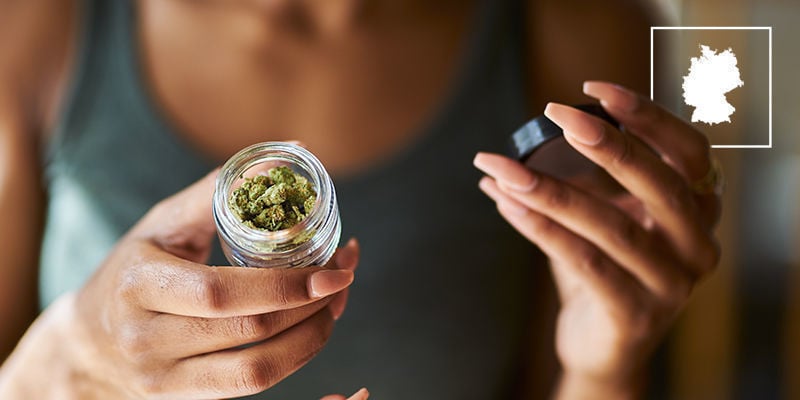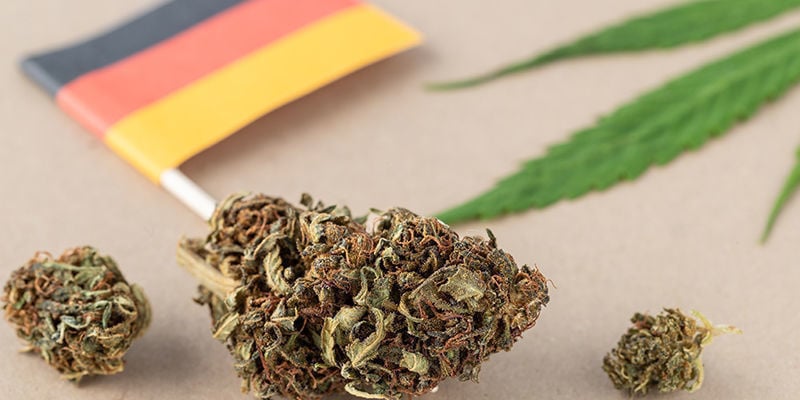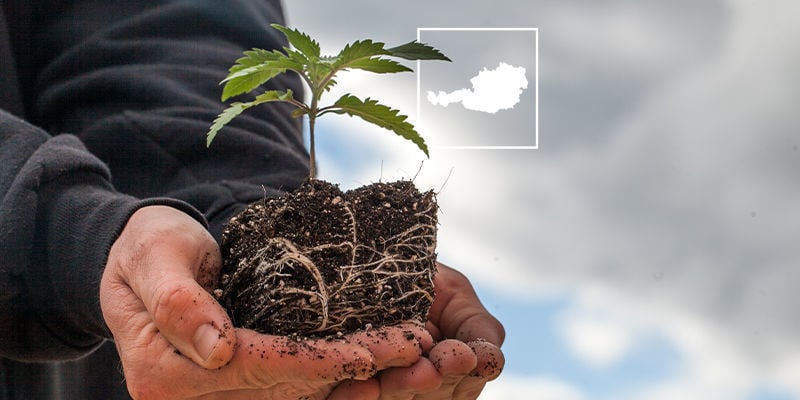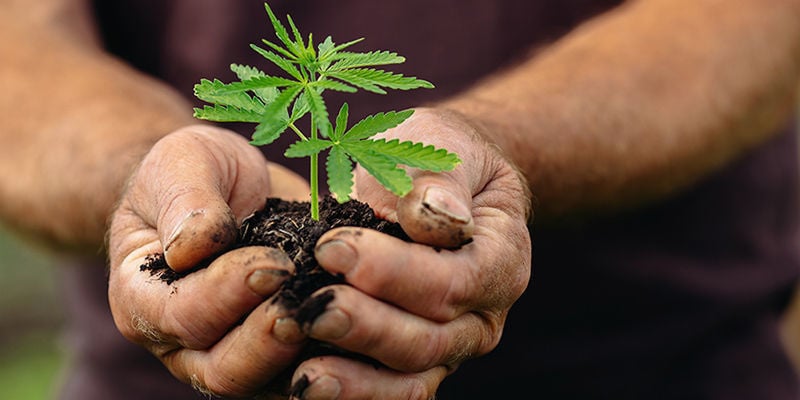
Germany Legalizes Cannabis in 2024
As of February 2024, cannabis laws have changed in Germany. Parliament has backed a new law that will allow adults to possess and grow relatively small amounts of cannabis. But what does this mean not only for Germany, but the rest of Europe and beyond? Here, we take a dive into all you need to know.
There has long been talk about updating cannabis laws in Germany, and as of February 2024, the legislation has been changed for the better. Whether you're a casual smoker or an avid home grower, read on to find out what these changes mean for Germany, and other countries in the EU, when they come into effect.
A brief background of cannabis in Germany

Before the passing of this legislation, cannabis containing more than 0.2% THC was illegal in Germany. As such, CBD products were allowed, but only if they contained negligible levels of THC. The only exception to this rule is cannabis intended for medical use. For seriously ill patients with certain approved conditions, it was possible for doctors to prescribe THC-rich cannabis.
However, all other forms of THC-containing cannabis were illegal. Whether you bought flower on the street or grew it yourself, it was against German law. What's more, it was even illegal to purchase cannabis seeds in Germany. While the seeds themselves were not technically illegal, it was illegal to buy them with the intent to grow them—and the German legal system assumes, by default, that buyers intend to grow them.
The good news is that it is still possible to order cannabis seeds online, and customers rarely run into problems. There have been isolated cases where the police have seized seeds in the post, but the buyers have not gone on to be prosecuted.
Depending on where you live in the country, you are likely to encounter different reactions to consuming cannabis. In a progressive city such as Berlin, for example, attitudes are usually much more relaxed, and you can often get away with smoking publicly, even in particular bars, without running into any trouble. That being said, it's still technically illegal, and while the police will often look the other way, they don't have to. However, attitudes in the rest of Germany tend to be much more strict.
Before the new legislation, the following applied if you were caught with cannabis in Germany:
- You cannot be prosecuted if you have under 10 grams
- You might not be prosecuted if you have under 15 grams
- You must be prosecuted if you have over 15 grams
What's more, driving or cycling under the influence, or using cannabis around children, could get you prosecuted regardless of the amount. While the more serious laws, such as driving under the influence, are not going to be relaxed, what are the new rules set to be laid out in 2024?
New cannabis legislation in Germany

Germany has become the latest country within Europe to legalize cannabis for personal use. With a parliament vote of 407 in favour and 226 opposed, as of the 1st of April, 2024, it will be legal for adults in Germany to possess up to 25 grams of cannabis in a public space and up to 50 grams in private. This is a vast difference compared to the previously mentioned prosecution rules. However, anyone with more than the specified amounts can be subject to a fine of up to 30,000 euros.
Adults will also be granted the freedom to grow cannabis in their homes. The current guidelines state that each adult can grow up to three flowering plants at any time. However, this is where there's a little bit of a “grey area”, as three small autoflowers, for example, will yield significantly less than three giant sativa photoperiod strains. So the current rule of “up to three plants” seems like it will see additional regulation in the future. But compared to the previous rules, this allowance is undoubtedly a massive change for cannabis growers.
But that's not all. In July 2024, we will see the introduction of officially regulated cannabis clubs in Germany. These establishments will serve as points of purchase, but will not facilitate smoking like coffeeshops in the Netherlands, for example. Limited to just 500 members per club, all members must be over 18 and have German citizenship. Members aged 18–21 will only be able to purchase up to 30g of cannabis per month, whereas those over 21 can buy up to 25g per day.
Critiques of Germany's new cannabis laws

While all of these changes are a step in the right direction for cannabis users, they've not arrived without their detractors. Archaic views of cannabis being a gateway drug and a bad influence on the younger generation still prevail in some pockets of German society. That said, the strict 18+ regulations in place will be avidly monitored with the aim of “drying out the black market”.
How big is the German cannabis market?
In early 2024, it was estimated that the illicit German cannabis market was worth around 14.9 billion dollars—making it an extremely lucrative industry.
By 2028, it is estimated that the legal German medical cannabis market will be worth 7.7 billion euros. When cannabis becomes fully legal in Germany, it will likely become the most significant cannabis market in Europe.
The status of cannabis in Austria

As the closest Southern neighbour to Germany, you might be thinking that Austria has a similar outlook on cannabis, but their rules are quite different. Technically, recreational cannabis containing over 0.3% THC is illegal in Austria. In practice, though, the law tends to be more relaxed. If you’re caught with a personal amount, under 10 grams, the punishment is usually very minimal, if there is any punishment at all. In most cases, personal use offences usually involve the “offender” being passed on to the health services, rather than facing legal prosecution.
Still, it is legally possible for people caught with even a small amount of cannabis to be fined or even jailed for up to six months. Those caught with amounts deemed to imply trafficking and sale face significantly harsher penalties.
Interestingly, it is legal to grow up to three cannabis plants per adult in Austria, so long as they contain less than 0.3% THC. This means you can grow male plants, female plants that you cull once they flower, or CBD-rich cannabis plants.
Generally, as long as the use is discreet and deemed to be personal, the police will not actively pursue cannabis-related crime in Austria.
Is it legal to smoke CBD in Austria?
Yes. CBD—or cannabis products containing less than 0.3% THC—is legal in Austria. This includes oil and flowers.
However, it is not legal to sell CBD-infused food in Austria. Therefore, products such as CBD gummies are not legal.
The future of cannabis in Europe (and beyond)

So, how will Germany's newly formed stance on cannabis influence others within the EU (and globally)? Clearly, neighbouring countries and provinces will be watching these laws roll out very closely. For Germans, the future of cannabis reform seems bright. But who knows? If the decriminalisation of cannabis is a success in Germany, it may well spread across Europe and further afield. Even if you're reading this in a country that currently looks down upon cannabis use and cultivation, you never know what the future might bring!
-
 6 min
22 May 2025
The top 10 most bizarre legal highs
Legal doesn’t mean safe—or smart. This list explores 10 strange and sometimes powerful legal drugs that highlight just how weird drug laws can be. It’s not a list of recommendations—just a glimpse...
6 min
22 May 2025
The top 10 most bizarre legal highs
Legal doesn’t mean safe—or smart. This list explores 10 strange and sometimes powerful legal drugs that highlight just how weird drug laws can be. It’s not a list of recommendations—just a glimpse...
-
 5 min
29 April 2025
The best legal (and natural) party drug alternatives
Looking to enhance your nights naturally? Discover safe, legal party drug alternatives—from herbal stimulants to mood boosters. Whether you're dancing until dawn or just socialising with friends,...
5 min
29 April 2025
The best legal (and natural) party drug alternatives
Looking to enhance your nights naturally? Discover safe, legal party drug alternatives—from herbal stimulants to mood boosters. Whether you're dancing until dawn or just socialising with friends,...
-
 7 min
18 May 2023
What Is A Cannabis Strain?
Purple Haze, Blue Dream, White Widow—there's no shortage of exotic cannabis strains out there. But what exactly constitutes a strain? Keep reading to learn everything there is to know about weed...
7 min
18 May 2023
What Is A Cannabis Strain?
Purple Haze, Blue Dream, White Widow—there's no shortage of exotic cannabis strains out there. But what exactly constitutes a strain? Keep reading to learn everything there is to know about weed...
-
 3 min
23 September 2021
Higher Standards — A New Gold Standard In Cannabis Products
Since their inception in 2016, Higher Standards has truly carved a name out for themselves in the world of cannabis products. Offering premium-quality accessories and water pipes, they've quickly...
3 min
23 September 2021
Higher Standards — A New Gold Standard In Cannabis Products
Since their inception in 2016, Higher Standards has truly carved a name out for themselves in the world of cannabis products. Offering premium-quality accessories and water pipes, they've quickly...





 United States
United States











